You are using an out of date browser. It may not display this or other websites correctly.
You should upgrade or use an alternative browser.
You should upgrade or use an alternative browser.
Breeding discussion
- Thread starter XyZ
- Start date
- Status
- Not open for further replies.
Charles Xavier
Member
Greetings British Hempire
I am under the impression your post is an elaboration of a point that muddy waters made; as my response to him intimated, I believe the position has a considerable degree of merit...
Two things:
Point one: The subjective use of the nomenclature is not at issue; it is the misunderstanding and misrepresentation of such that is found to be objectionable.
The intermediary: One of a forum's foremost purposes is as a resource centre for information; it should be obvious that the reliability of said information is required (and need be verifiable) in order to satisfy that particular mandate.
Point two: It should be stated- a thorough understanding of the nomenclature is conducive to a comprehension of the Law; familiarity with the Law is applicable to the practice.
Make no mistake, 'Raco's Moroccan farmers' may not employ the same nomenclature, but the most accomplished of them certainly possess the fundamental understanding of the Law and apply it to their practice; what they do not do, is redefine an existing and established terminology.
When I say - NaCl...I am not just saying table salt. I am saying Sodium Chloride. I am saying a chemical compound of Sodium and Chlorine i.e. a substance consisting of these two elements chemically bonded together in a fixed proportion by mass. I am stating that the reason atoms react with each other is to reach a state in which their valence shells are filled. Furthermore, in their atomic states, Sodium has one valence electron and Chlorine has seven; Sodium forms a positive ion by 'donating' an electron; Chlorine 'adopts' an electron to form a negative ion...exothermic reaction based on attraction...ionic bonding...compound stability...relative position in the periodic table...metals and non-metals...a blueprint on how and why the atoms will react. I am saying all of this and anyone else who is fluent in this language recognizes this.
Though it may seem silly, if I say – NACl…as far as chemistry is concerned, I’m speaking gibberish. That’s why conventions are followed to the letter especially when: the use of convention was opted for and public discourse was invited.
The same as above apply to genetic nomenclature; to truly understand the language takes an understanding of not only the concepts, but of the practical applications, as well. Undoubtedly that type of information would be of asset in obtaining your stated goals.
An aside: whether you recognize it or not, you have made a (intellectual or intuitive) decision on what specimens to employ in your breeding program based on genetic law (math). It is the same for all breeders.
Sincerely,
Charles.
p.s. Hola Raco
Agreed; however, every master artist followed established techniques, or created techniques that became established; there is science in everything well accomplished; meaning, there is a knowledge, of facts or principles or insights, gained by the systematic study of any subject.
C.X.
I am under the impression your post is an elaboration of a point that muddy waters made; as my response to him intimated, I believe the position has a considerable degree of merit...
Two things:
Point one: The subjective use of the nomenclature is not at issue; it is the misunderstanding and misrepresentation of such that is found to be objectionable.
The intermediary: One of a forum's foremost purposes is as a resource centre for information; it should be obvious that the reliability of said information is required (and need be verifiable) in order to satisfy that particular mandate.
Point two: It should be stated- a thorough understanding of the nomenclature is conducive to a comprehension of the Law; familiarity with the Law is applicable to the practice.
Make no mistake, 'Raco's Moroccan farmers' may not employ the same nomenclature, but the most accomplished of them certainly possess the fundamental understanding of the Law and apply it to their practice; what they do not do, is redefine an existing and established terminology.
When I say - NaCl...I am not just saying table salt. I am saying Sodium Chloride. I am saying a chemical compound of Sodium and Chlorine i.e. a substance consisting of these two elements chemically bonded together in a fixed proportion by mass. I am stating that the reason atoms react with each other is to reach a state in which their valence shells are filled. Furthermore, in their atomic states, Sodium has one valence electron and Chlorine has seven; Sodium forms a positive ion by 'donating' an electron; Chlorine 'adopts' an electron to form a negative ion...exothermic reaction based on attraction...ionic bonding...compound stability...relative position in the periodic table...metals and non-metals...a blueprint on how and why the atoms will react. I am saying all of this and anyone else who is fluent in this language recognizes this.
Though it may seem silly, if I say – NACl…as far as chemistry is concerned, I’m speaking gibberish. That’s why conventions are followed to the letter especially when: the use of convention was opted for and public discourse was invited.
The same as above apply to genetic nomenclature; to truly understand the language takes an understanding of not only the concepts, but of the practical applications, as well. Undoubtedly that type of information would be of asset in obtaining your stated goals.
An aside: whether you recognize it or not, you have made a (intellectual or intuitive) decision on what specimens to employ in your breeding program based on genetic law (math). It is the same for all breeders.
Sincerely,
Charles.
p.s. Hola Raco
Breeding is an "art"....Raco
Agreed; however, every master artist followed established techniques, or created techniques that became established; there is science in everything well accomplished; meaning, there is a knowledge, of facts or principles or insights, gained by the systematic study of any subject.
C.X.
G
Guest
Thanks for the considered response Charles, and you make very valid points. There is a whole slew of information available regarding correct nomenclature, this is not a cannabis specific topic, it applies to all plant genetics, therefore the info is widely available for those who want to understand this topic fully.
My point was merely that a in-depth understanding of the proper nomenclature is not necessary to be able to breed cannabis. It is more important imho to study the actual plants themselves closely, to get your fingers dirty and learn through direct experience. I truly feel that an hour spent with your plants will teach you more than 10 hours of arguing online.
The comparison between breeding and art is valid in some ways, however perhaps my take on it is slightly different to most. I believe that art can be created by anyone, regardless of their academic training, some great artists spent years studying and training, while others took the approach of picking up a pencil or a brush and working and working, exploring their inner creativity and finding their own route to the free expression of that creativity. Some artists have to be taught to express their creativity, it has to be coaxed out of them, others find their own path. I went to art college and found that the academic study of art didn't increase my abilities or my appreciation of art, I'd already spent most of my life developing my own skills through simply drawing and painting almost every day for many years. Compostion can be taught, but can also be learnt intrinsically through experience and having a good eye to begin with, that's a good example of the academic learning vs real experience point I think. The Golden Ratio was only 'invented' in the Italian Renaissance, but for many centuries before that, art was being produced with aesthetically correct proportions, the codification of the art/science of aesthetically pleasing proportion merely made the teaching of composition easier, it was merely the distilling into a firm 'law' of age-old wisdom.
With breeding, I am sure a thorough academic schooling is a good base to begin from, but only a starting point, actual experience of directly working with the plants and subsequent generations of progeny is far more important imho. It's the old theory vs practice argument I suppose, a professor of biology can theorise all day but it's the farmers and breeders who really have the knowledge, again, I think the plants themselves are the best teachers to learn from.
My point was merely that a in-depth understanding of the proper nomenclature is not necessary to be able to breed cannabis. It is more important imho to study the actual plants themselves closely, to get your fingers dirty and learn through direct experience. I truly feel that an hour spent with your plants will teach you more than 10 hours of arguing online.
The comparison between breeding and art is valid in some ways, however perhaps my take on it is slightly different to most. I believe that art can be created by anyone, regardless of their academic training, some great artists spent years studying and training, while others took the approach of picking up a pencil or a brush and working and working, exploring their inner creativity and finding their own route to the free expression of that creativity. Some artists have to be taught to express their creativity, it has to be coaxed out of them, others find their own path. I went to art college and found that the academic study of art didn't increase my abilities or my appreciation of art, I'd already spent most of my life developing my own skills through simply drawing and painting almost every day for many years. Compostion can be taught, but can also be learnt intrinsically through experience and having a good eye to begin with, that's a good example of the academic learning vs real experience point I think. The Golden Ratio was only 'invented' in the Italian Renaissance, but for many centuries before that, art was being produced with aesthetically correct proportions, the codification of the art/science of aesthetically pleasing proportion merely made the teaching of composition easier, it was merely the distilling into a firm 'law' of age-old wisdom.
With breeding, I am sure a thorough academic schooling is a good base to begin from, but only a starting point, actual experience of directly working with the plants and subsequent generations of progeny is far more important imho. It's the old theory vs practice argument I suppose, a professor of biology can theorise all day but it's the farmers and breeders who really have the knowledge, again, I think the plants themselves are the best teachers to learn from.
G
Guest
BritishHempire:
Hi!! We chatted privately earlier this year when I had another nick. I enjoyed out conversations muchly.
It may be true that you and many others don't need to know or use the correct jargon to do the breeding you do. Some of us who are rank amateur newbies might need, or want, to learn how things are done correctly. At least initially.
IMO, using a common language (standard breeding terminology) when discussing breeding is vital to getting things done right for those of us with limited experience and/or knowledge.
I admire anyone who has done what you have accomplished in that very limited space you have to grow!! I'm hoping to make some seeds this next run before I quit for the summer. Maybe cross some of Shanti's SSH with Malawi Gold? If I can get my MG to germ. 0/4 so far
pedro
Hi!! We chatted privately earlier this year when I had another nick. I enjoyed out conversations muchly.
It may be true that you and many others don't need to know or use the correct jargon to do the breeding you do. Some of us who are rank amateur newbies might need, or want, to learn how things are done correctly. At least initially.
IMO, using a common language (standard breeding terminology) when discussing breeding is vital to getting things done right for those of us with limited experience and/or knowledge.
I admire anyone who has done what you have accomplished in that very limited space you have to grow!! I'm hoping to make some seeds this next run before I quit for the summer. Maybe cross some of Shanti's SSH with Malawi Gold? If I can get my MG to germ. 0/4 so far
pedro
Charles, there are some points raised in this thread that I would like to know the accepted truth about, would you please be good enough to enlighten me?
To my knowledge, and only gained through reading sources of info, possibly missinfo, rather than through formal study, the use of terms such as F2 are acceptable. In your posts you raised the possibilty that this may not be so (my interpretation of your words which may itself be inaccurate).
[Edit]....yup my reading of your words was errored, you can forget this question.
I also beleived that a selfed plant was an S1 rather than an F2 as it has been claimed repeatedly in this thread. I know that Reeferman for one is selling F7s, which according your your post, I would take to mean an "IL" (I want to get this right) which is still showing variability. Also from your post, I would gather that a backcross is irrelevant when refering to an IL as no new genetic information has been introduced. Even though it has its own prefix of IBL.
On a side note: Having spoken to Tom Hill in chat, he used plants which exhibited differing traits when creating his DC IL rather than those which showed the same traits, whereas in this thread it has been indicated that plants with the same traits must be used in order to create a stable IL. Given that for a difference to be exhibited between 2 entities, either the conditions must be different (in order to turn genes on or off) or the entity must contain differing genes, plants which exhibit separate phenotypes within the same garden are likely to contain differing genes. Therefore each generation of DC was an introduction of new genetic material due to the differences in plants selected from the same generation. Now ok these genetic diferences will be small, but each generation will contain new mutations (see the island of Madagascar (sp) to see the long term effect of this). This would suggest to me that the number of generations of IL will have an effect upon the plants that are grown, and therefore if I see a generation of (DC for example) that I wanted, I would be wise not to just look for DC IL, but which generation of DC IL the example I wished to replicate was. To me this would indicate that simply using the IL suffix would be insufficient for me to go shopping with. I'd love to hear your thoughts on this too Charles.
To my knowledge, and only gained through reading sources of info, possibly missinfo, rather than through formal study, the use of terms such as F2 are acceptable. In your posts you raised the possibilty that this may not be so (my interpretation of your words which may itself be inaccurate).
[Edit]....yup my reading of your words was errored, you can forget this question.
I also beleived that a selfed plant was an S1 rather than an F2 as it has been claimed repeatedly in this thread. I know that Reeferman for one is selling F7s, which according your your post, I would take to mean an "IL" (I want to get this right) which is still showing variability. Also from your post, I would gather that a backcross is irrelevant when refering to an IL as no new genetic information has been introduced. Even though it has its own prefix of IBL.
On a side note: Having spoken to Tom Hill in chat, he used plants which exhibited differing traits when creating his DC IL rather than those which showed the same traits, whereas in this thread it has been indicated that plants with the same traits must be used in order to create a stable IL. Given that for a difference to be exhibited between 2 entities, either the conditions must be different (in order to turn genes on or off) or the entity must contain differing genes, plants which exhibit separate phenotypes within the same garden are likely to contain differing genes. Therefore each generation of DC was an introduction of new genetic material due to the differences in plants selected from the same generation. Now ok these genetic diferences will be small, but each generation will contain new mutations (see the island of Madagascar (sp) to see the long term effect of this). This would suggest to me that the number of generations of IL will have an effect upon the plants that are grown, and therefore if I see a generation of (DC for example) that I wanted, I would be wise not to just look for DC IL, but which generation of DC IL the example I wished to replicate was. To me this would indicate that simply using the IL suffix would be insufficient for me to go shopping with. I'd love to hear your thoughts on this too Charles.
Last edited:
G
Guest
British_Hempire said:I'm working on a hybrid at the moment where both parents are of unknown origin, one is from seeds I personally collected in Mexico from brickweed, the other was collected by a friend in Afghanistan. .
I was wondering who would be the first guy I read about to pull the token "friend in afghanistan" comment on the seeds they have.
You sir should win a prize for your efforts.

G
Guest
BritishHempire:
Don't pay any attention to assholes on here. And I hope you didn't take my remarks as being overly critical. I gotta admire a guy who has done what you have done given your resources!
I love reading about all the exotic strains you grow and write about.
Keep it up!!!!!!!

pedro
Don't pay any attention to assholes on here. And I hope you didn't take my remarks as being overly critical. I gotta admire a guy who has done what you have done given your resources!
I love reading about all the exotic strains you grow and write about.
Keep it up!!!!!!!

pedro
D
Dalaihempy
Hi all to be honest i havent read all this thread but breedings a topic that can get real intresting and some times heated.
Personaly i dont look at it in a scientific way becouse all the theary in the world wont mean a set resolt i think hands on and understanding the plant is a big part of it but haveing a basic understanding of how breeding works is for me the best starting point.
I rember reading R clarks book on mj botany well some of it and what realy stuck in my mind was were he Rob in short sed mj / cannabis breeds like no other plant so i found it hard to understand how corn/pee and other ag crop breeding methods was used in mj / cannabis breeding thearys.
I think breeding has an ellement of art and an ellement of luck and a large ellement of work in it but also a direction a given breeder sets meaning 3 people can start with a set of seeds and all 3 will end up with diffrent resolts years later.
I feel a lot dont understand the value a male plant plays in breeding most go by the look of a male alone i also dont understand why one has to use many males over a single female to me if its a pure line / true breeding why do you need more than one selected male over that fem as all the strains dna should in theary be in one male plant any way no diffrence if its 1 or 2 or 3 and i have seen many growers threw the years select there strongest male of each years crop to make seed with there strongest fem of a given strain and i never saw there strain lines become less potent or show less vigor and in veggys for years i rember they selected the largest cucumber to collect seed and so on in each given crop for next years crops.
People need to relise the basics wich is good genetics there is what makes good cannabis then you need to relise if its a hybreed selections key and that means growing harvesting cureing sampling not just going by there look.
Personaly i dont look at it in a scientific way becouse all the theary in the world wont mean a set resolt i think hands on and understanding the plant is a big part of it but haveing a basic understanding of how breeding works is for me the best starting point.
I rember reading R clarks book on mj botany well some of it and what realy stuck in my mind was were he Rob in short sed mj / cannabis breeds like no other plant so i found it hard to understand how corn/pee and other ag crop breeding methods was used in mj / cannabis breeding thearys.
I think breeding has an ellement of art and an ellement of luck and a large ellement of work in it but also a direction a given breeder sets meaning 3 people can start with a set of seeds and all 3 will end up with diffrent resolts years later.
I feel a lot dont understand the value a male plant plays in breeding most go by the look of a male alone i also dont understand why one has to use many males over a single female to me if its a pure line / true breeding why do you need more than one selected male over that fem as all the strains dna should in theary be in one male plant any way no diffrence if its 1 or 2 or 3 and i have seen many growers threw the years select there strongest male of each years crop to make seed with there strongest fem of a given strain and i never saw there strain lines become less potent or show less vigor and in veggys for years i rember they selected the largest cucumber to collect seed and so on in each given crop for next years crops.
People need to relise the basics wich is good genetics there is what makes good cannabis then you need to relise if its a hybreed selections key and that means growing harvesting cureing sampling not just going by there look.
Yeah,you guessed it...I was recently adopted by Arjan and his wife....He was tired of collecting clones,and wanted to start collecting Real Breeders,instead.
I did add those tags to commercial marijuana seeds,and imo that's not a bad legacy,to add a lil' clarity in an otherwise muddy field.
Art In Selection,is The Rule of Law is a slogan,I should probably put a (C) on it before greenhouse co-opts it. :smile:
....Now where's Mommy,I need some cannabis!
I did add those tags to commercial marijuana seeds,and imo that's not a bad legacy,to add a lil' clarity in an otherwise muddy field.
Art In Selection,is The Rule of Law is a slogan,I should probably put a (C) on it before greenhouse co-opts it. :smile:
....Now where's Mommy,I need some cannabis!
muddy waters
Active member
Nice to see you C.X., and as always, thanks for the information.
B.H., to get to the heart of it, I think you are right that plant breeding can be learned intuitively but I would also suggest that learning intuitively and learning conventionally (that is theoretically, therefore using nomenclature) need not be mutually exclusive.
Speaking for myself, if in the future my projects incorporate advanced techniques or extremely precise selections for traits, and if I seek cooperation from other growers, I will be labelling things as precisely and properly as I can. That just makes sense.
However in the absence of knowledge of convention, one does it their own way, and can get by (I think that was tio Raco's point). Obviously many of the finer contributors to cannabis breeding undertook it clandestinely and never were trained in proper terminology.
B.H., to get to the heart of it, I think you are right that plant breeding can be learned intuitively but I would also suggest that learning intuitively and learning conventionally (that is theoretically, therefore using nomenclature) need not be mutually exclusive.
Speaking for myself, if in the future my projects incorporate advanced techniques or extremely precise selections for traits, and if I seek cooperation from other growers, I will be labelling things as precisely and properly as I can. That just makes sense.
However in the absence of knowledge of convention, one does it their own way, and can get by (I think that was tio Raco's point). Obviously many of the finer contributors to cannabis breeding undertook it clandestinely and never were trained in proper terminology.
To quote Monty Python:
"Is this the right room for an argument?"
"I told you once."
"No you didn't."
"Yes I did"...etc...
I think there's ample scope, and enough smart folks on here to come up with some new lexicon that everyone can adopt for specific cannabis-breeding issues. I'm learning to breed myself, and whilst simple F generations from unrelated strains are a doddle, more complex incrossing within strains can get quite tricky to denote, especially for beginners like me.
For example, I had two Flo females, which I crossed with two different males. I grew 'Fn+1' seeds from batch 1A (#1Fem X #1Male) and selected another male from those - my 2nd-gen from the original seed-stock. So now if I decide to pollenate one of my other Flo females, one that was never involved in the original cross, but was a direct sibling of the original female parent, what do I call that? Is it a backcross to its 'great-aunt'? Or even if I pollenate the original #2 female, which shared some of the genes with the generation before - it's still tricky to know what to call it. DJ Short's labelling code or similar seems most appropriate, but on the small scale I can work on, like British Hempire, it's probably overkill to go that far - I'm not setting up a commercial seed label, just learning the process to make better weed for myself.
I'm all for a diagrammatic version - I'm trying to come up with a 'family tree' of my crosses that would help me see where I was, and which would include symbols rather than letters to denote forward and backward (and sideways!) crossing. I always loved Rob Clarke's 'glyphs' that he used in Marijuana Botany to denote purple/green calyx, pinnate/webbed leaf etc. Symbols can be much easier to interpret than words, especially, as we've seen here, when multi-language users are trying to communicate.
We should also try to remember that we're all 'foreigners' on a site like this, despite English being the common language - sometimes the local dialect and/or phrasing can go unrecognised as the joke it was meant to be, and be seen as offensive instead. I can't speak any other languages fluently, and I'm always impressed that folks can argue in such detail in a foreign language, even if I don't always understand the argument!
As for breeding, I learnt much of what I know from here, so the resource is still much more valuable to me than the time 'wasted' reading an endless argument...
"Is this the right room for an argument?"
"I told you once."
"No you didn't."
"Yes I did"...etc...
I think there's ample scope, and enough smart folks on here to come up with some new lexicon that everyone can adopt for specific cannabis-breeding issues. I'm learning to breed myself, and whilst simple F generations from unrelated strains are a doddle, more complex incrossing within strains can get quite tricky to denote, especially for beginners like me.
For example, I had two Flo females, which I crossed with two different males. I grew 'Fn+1' seeds from batch 1A (#1Fem X #1Male) and selected another male from those - my 2nd-gen from the original seed-stock. So now if I decide to pollenate one of my other Flo females, one that was never involved in the original cross, but was a direct sibling of the original female parent, what do I call that? Is it a backcross to its 'great-aunt'? Or even if I pollenate the original #2 female, which shared some of the genes with the generation before - it's still tricky to know what to call it. DJ Short's labelling code or similar seems most appropriate, but on the small scale I can work on, like British Hempire, it's probably overkill to go that far - I'm not setting up a commercial seed label, just learning the process to make better weed for myself.
I'm all for a diagrammatic version - I'm trying to come up with a 'family tree' of my crosses that would help me see where I was, and which would include symbols rather than letters to denote forward and backward (and sideways!) crossing. I always loved Rob Clarke's 'glyphs' that he used in Marijuana Botany to denote purple/green calyx, pinnate/webbed leaf etc. Symbols can be much easier to interpret than words, especially, as we've seen here, when multi-language users are trying to communicate.
We should also try to remember that we're all 'foreigners' on a site like this, despite English being the common language - sometimes the local dialect and/or phrasing can go unrecognised as the joke it was meant to be, and be seen as offensive instead. I can't speak any other languages fluently, and I'm always impressed that folks can argue in such detail in a foreign language, even if I don't always understand the argument!
As for breeding, I learnt much of what I know from here, so the resource is still much more valuable to me than the time 'wasted' reading an endless argument...
Last edited:
G
Guest
I was wondering who would be the first guy I read about to pull the token "friend in afghanistan" comment on the seeds they have.
Hehe, I have a friend who has a relative in the British Army who was unlucky enough to be posted to Afghanistan a couple of years ago, he brought some seeds back and I was lucky enough to be gifted some. I call it Purple Afghan cos it's very purple and it came from Afghanistan, near Kandahar I believe.
That being said...British Hempire,
(Cool name,the 'sun never sets when it's sodium,eh!)
Drop a copy of your thread in mah' forum,I simply adore the kind of effort you're undertaking....
Cheers Rez, always happy to share my experiences. Very true, the HPS will never set on this Hempire! lol
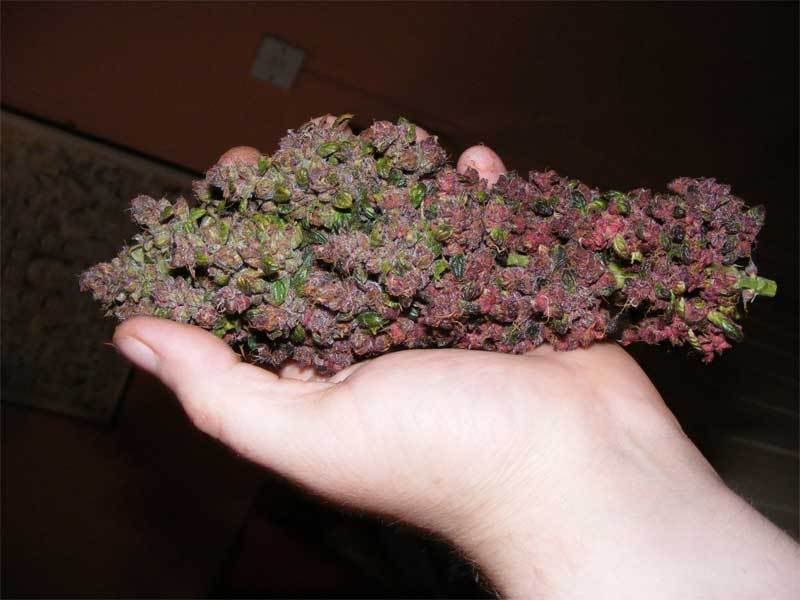
I chose the best male and made several crosses to test what traits he passed on, currently I have a couple of PA x Cheese ladies, this one in flower is looking surprisingly sativa and is producing a nice number of trichomes on her leaves.
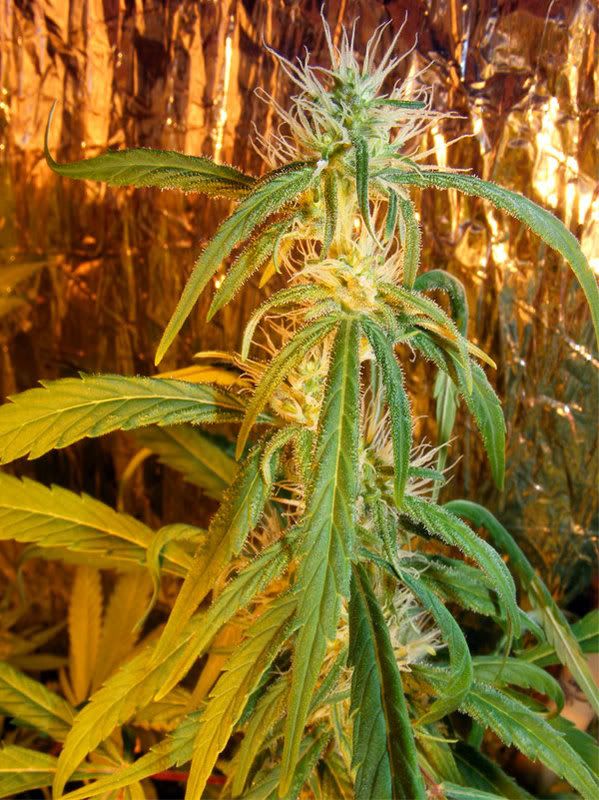
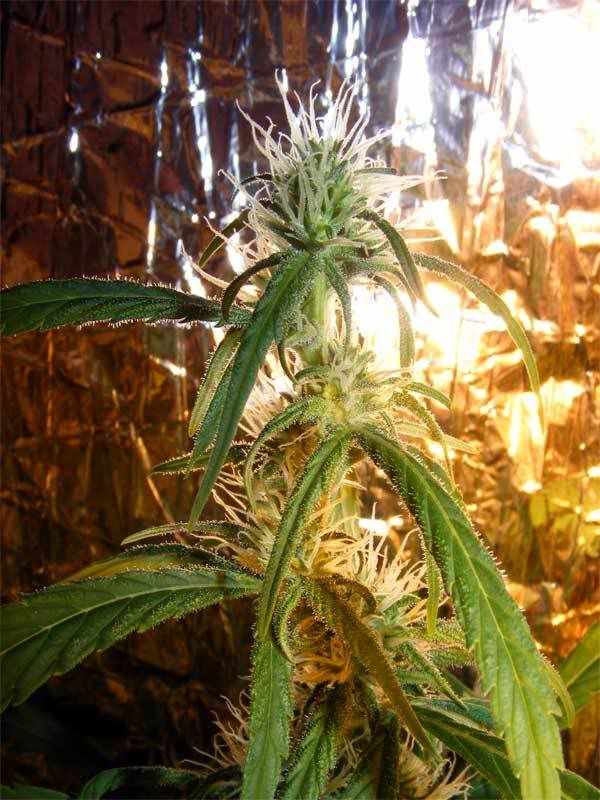
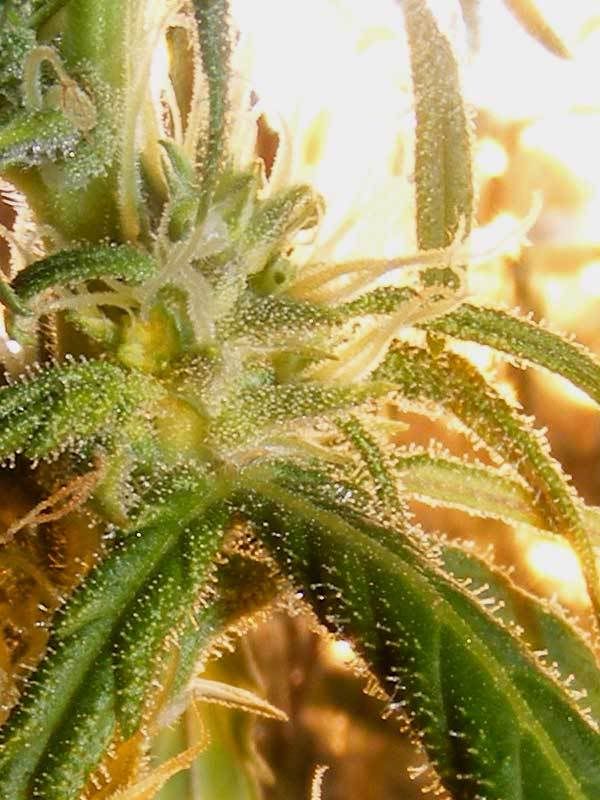
One of the nicest ladies in my garden at the moment is this Sour Diesel IBL, I've kept a male of this pheno for future experiments. Growing strange and exotic seeds from far flung corners of the world is all fine and well, but it's a crapshoot whether they will produce a nice harvest indoors or not, for every nice plant I've found from seeds collected in places like Mexico and Egypt I've had 2 or 3 that were crap and didn't flower properly under lights. So I always have a few ladies alongside them that I know WILL produce, hence the Sour Diesel, Trainwreck etc. I'm also growing right now.
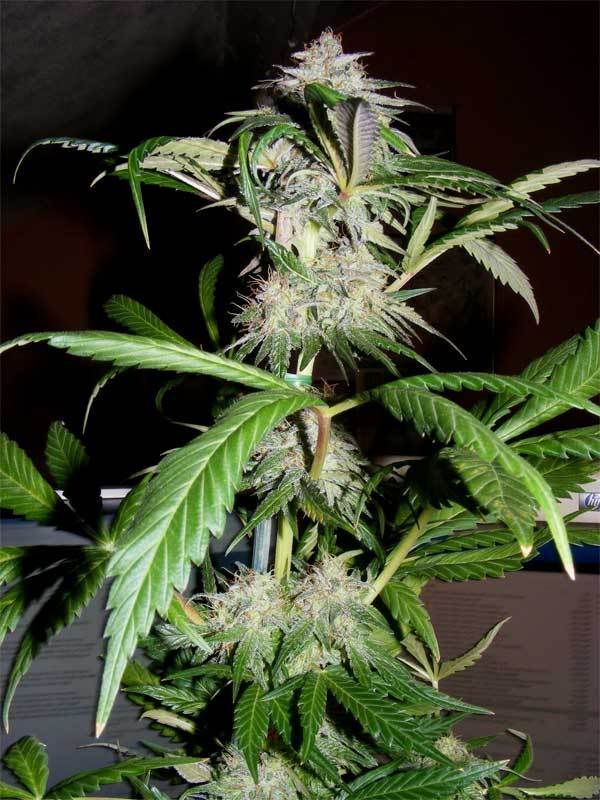
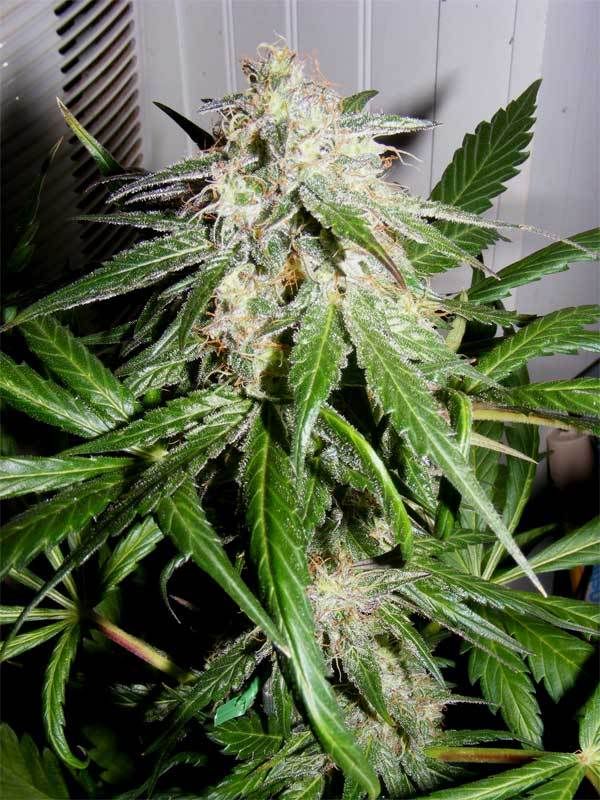
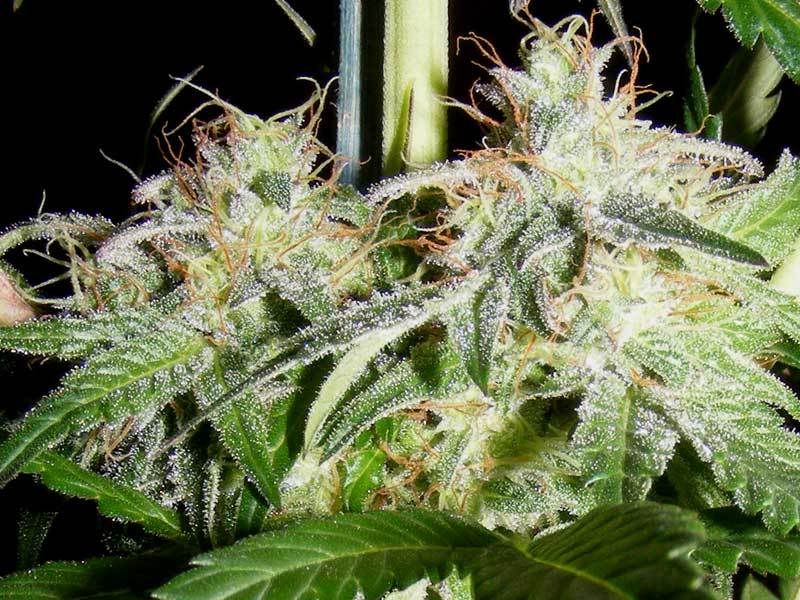
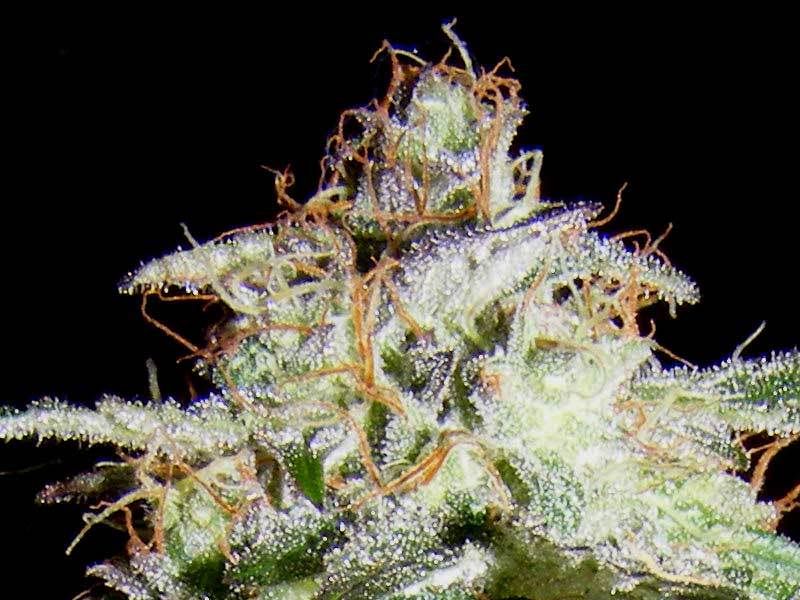
MagicCarpetRide said:I was wondering who would be the first guy I read about to pull the token "friend in afghanistan" comment on the seeds they have.
You sir should win a prize for your efforts.
Well,spanish soldiers brought seeds from both Afghanistan and Lebanon to Spain.. other individuals,not troops,too...so what´s the deal??
I have plenty,plenty...

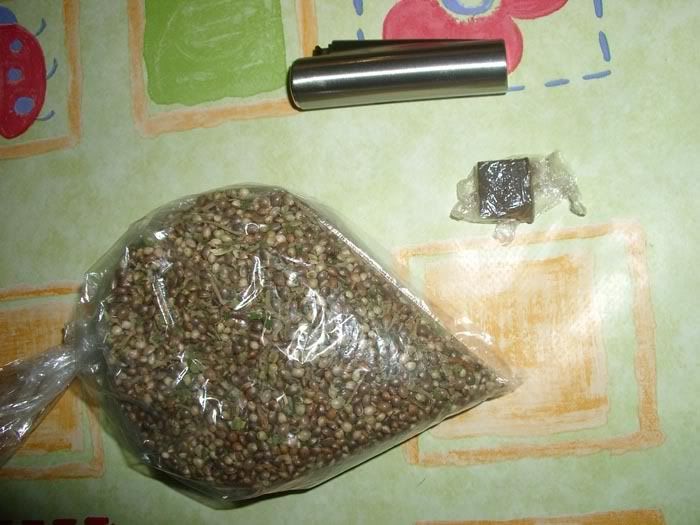
muddy waters said:However in the absence of knowledge of convention, one does it their own way, and can get by (I think that was tio Raco's point). Obviously many of the finer contributors to cannabis breeding undertook it clandestinely and never were trained in proper terminology.

G
Guest
That's a nice bag of Lebanese seeds Raco, you lucky fella!
To be honest, the exact origins of something is of very much secondary importance to me, the prime factor beign whether the plants the seeds produce are good or not.
To be honest, the exact origins of something is of very much secondary importance to me, the prime factor beign whether the plants the seeds produce are good or not.
- Status
- Not open for further replies.




